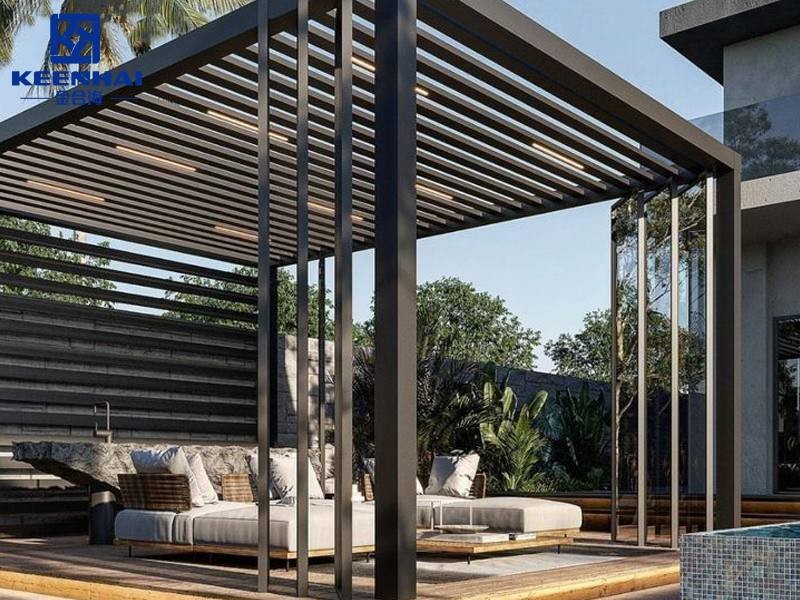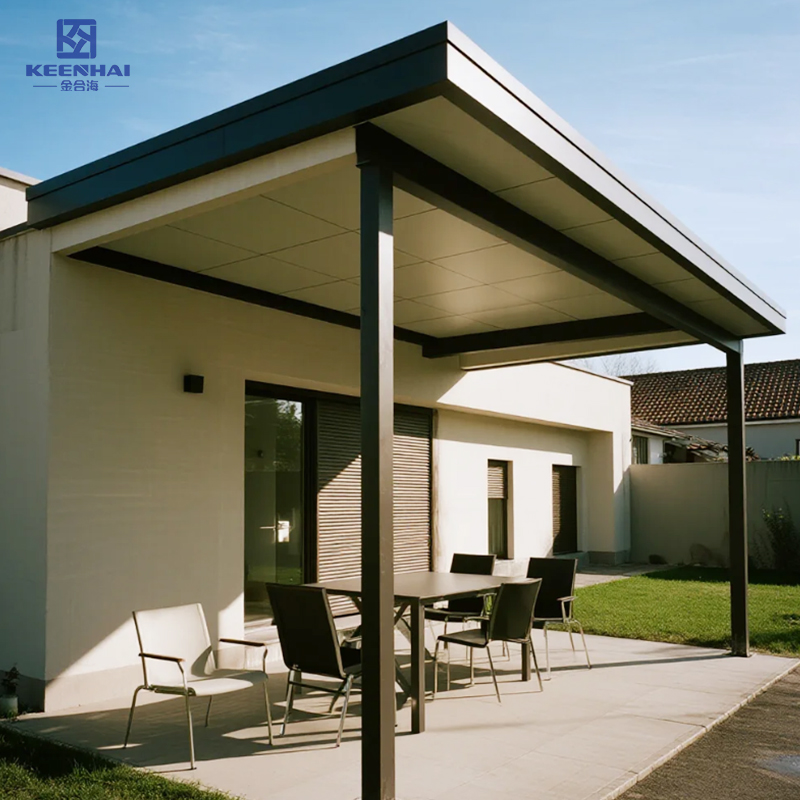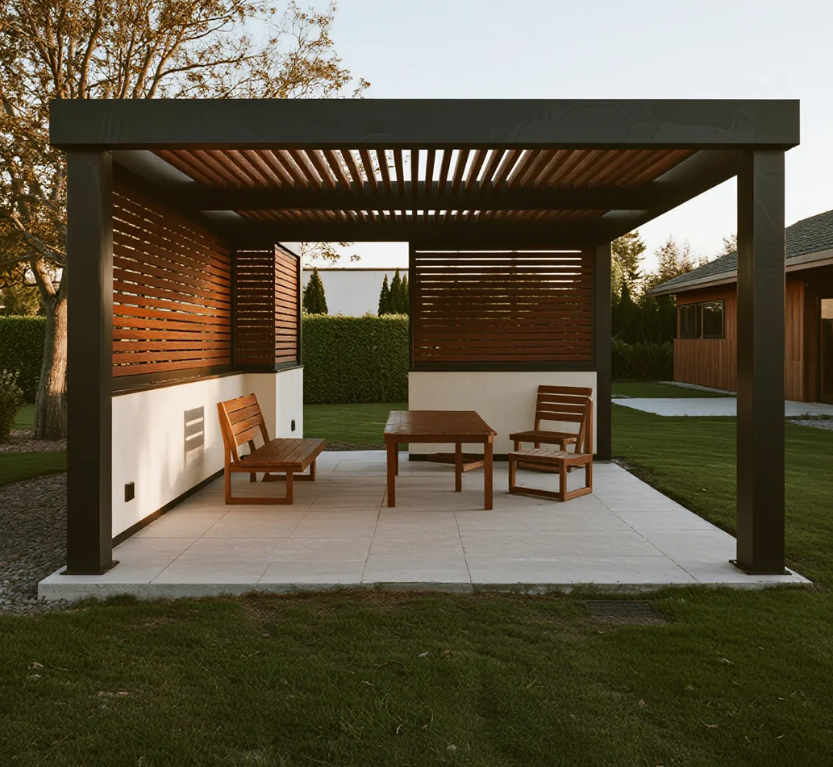
1. Pergola Types by Material
1.1 Wooden Pergolas: Natural Look, Higher Maintenance
Wood is still the go-to choice for homeowners chasing a rustic backyard vibe. Picture a cedar pergola with climbing vines wrapping around the posts — it instantly softens a patio and feels timeless. The downside? It needs seasonal sealing and repainting, especially in humid or rainy climates. We’ve seen projects in Florida where a cedar frame started warping after just five years because of constant moisture. That’s why many people who love the look still end up switching later to an adjustable louver pergola which mimics the open-air feel but lasts far longer with less upkeep.
1.2 Aluminum Pergolas: Modern, Durable, Low Upkeep
Aluminum stands out for its clean lines and near-zero maintenance. Unlike wood, it won’t crack or rot, and the powder-coated surface handles sun and rain with ease. For example, a family in Texas installed an Aluminum louvered roof gazebo over their poolside deck. Even in 100°F heat, the structure stayed stable and the louvers let them control ventilation on hot afternoons. Aluminum pergolas are also customizable with LED strips, motorized louvers, and even sliding glass side panels, making them a practical pick for modern outdoor living.
1.3 Vinyl Pergolas: Budget-Friendly, Lightweight Options
Vinyl pergolas attract buyers looking for low upfront cost. They don’t need staining or painting, and the bright white color matches most suburban homes. However, they don’t carry the same structural strength as wood or aluminum. A vinyl frame may sag if fitted with heavy climbing plants, and strong winds can be an issue. In New Jersey, we saw a homeowner choose vinyl for a small garden corner where it worked fine, but they avoided using it for the main patio because of durability concerns. In terms of price and longevity, vinyl is often compared against steel — see the table below for clarity:
| Material | Average Lifespan | Maintenance Needs | Price Range (10x12 ft) |
|---|---|---|---|
| Vinyl | 10–15 years | Minimal | $1,200–$2,000 |
| Steel | 20+ years | Occasional coating | $3,000–$5,000 |
1.4 Steel Pergolas: Industrial Style and Strength
Steel pergolas bring an urban, industrial edge to a backyard or rooftop. Their biggest selling point is raw strength — ideal for wide spans or commercial settings. In Chicago, a rooftop bar used a modern aluminum gazebo design for its lounge seating, but combined it with steel framing to handle heavy snow loads in winter. The trade-off is weight and rust risk; powder coating is essential to keep corrosion in check. For residential homes, steel often feels like overkill unless you’re aiming for a bold architectural statement. For larger builds, however, it’s one of the most stable options you can choose.

2. Roof and Shade Options
2.1 Open-Top Pergolas: Light and Airy Feel
An open-top pergola is the most traditional choice — no roof panels, just beams that create a frame for climbing vines or hanging lights. The appeal lies in its simplicity: sunlight filters through during the day, while evenings feel cozy under string bulbs. Many homeowners in coastal towns like San Diego install these to keep their patios breezy and bright.
If you’re planning to build one, the process usually involves:
-
Setting up four corner posts on a leveled patio surface.
-
Securing cross beams to create the open grid.
-
Adding decorative elements like lattice panels or climbing plants.
This type of structure works beautifully for those who want a natural, garden-inspired atmosphere. However, for areas with intense midday sun, families often look to more advanced solutions like a modern louvered pergola shade system which balances openness with protection when needed.
2.2 Louvered Pergolas: Adjustable Shade and Ventilation
The standout feature of a louvered pergola is flexibility. With adjustable slats, you can control sunlight, shade, and airflow. On hot afternoons, the panels tilt shut to block UV rays; on cool mornings, you can open them up for natural warmth. In one Florida project, a family installed an Aluminum louvered roof gazebo over their outdoor kitchen. They loved the fact that even during sudden summer showers, the automatic rain sensors would close the roof within seconds.
Installing a louver system typically involves three main steps:
-
Anchoring the aluminum frame onto the patio or deck.
-
Mounting motorized louvers with waterproof seals.
-
Connecting optional add-ons like LED lights or side screens for privacy.
Because of this versatility, louvered pergolas are becoming the go-to solution for homeowners who want their patio to be usable year-round, not just in good weather.
2.3 Retractable Canopy Pergolas: Flexible Weather Control
Retractable canopy pergolas offer a balance between full shade and open sky. The roof fabric slides along rails, allowing you to pull it back on sunny mornings or extend it fully during light rain. A couple in Arizona added one next to their pool area — in the mornings, they opened the canopy to enjoy the desert sun, and by afternoon, they slid it shut to keep their kids cool.
The design is straightforward yet stylish. Many modern models combine aluminum frames with high-tensile outdoor fabric, creating both durability and elegance. Some homeowners even integrate this style with an Aluminum Modern Gazebo to enhance the architectural look. While not as durable as louvers, retractable canopies are affordable and easy to operate, making them a solid choice for smaller patios or rental properties.

3. Matching Pergola Types with Outdoor Spaces
3.1 Best Choices for Small Patios and Decks
If your backyard is on the smaller side, the trick is choosing a pergola that doesn’t overwhelm the space. A compact structure with a slim frame works best, especially if your patio is right off the living room or kitchen. One popular option is a louvered pergola which gives you flexibility without taking up too much room. Homeowners often use these on townhome decks or narrow patios to create a cozy corner with a small seating set. The adjustable louvers let you block afternoon sun while still keeping airflow, making the space feel bigger and more usable.
3.2 Ideal Pergolas for Gardens and Courtyards
When you’re working with a courtyard or garden, you want a pergola that blends with greenery instead of competing with it. A Aluminum louvered roof gazebo is a strong choice here. Its clean lines and solid roof panels pair beautifully with climbing vines, giving both shade and structure to the garden. Many homeowners install these over a stone pathway or next to a water feature, creating a shaded retreat where you can relax without worrying about sudden rain showers. To enhance the look, people often add soft string lighting and outdoor curtains, making the courtyard usable late into the evening.
3.3 Large-Scale Options for Poolsides or Commercial Use
For bigger spaces like poolsides, restaurants, or even hotel lounges, scale and durability become the main priorities. Here, a Aluminum Modern Gazebo or even a custom pergola with multiple connected modules works best. These designs allow you to cover long seating rows or outdoor dining areas without breaking up the layout. In many resort projects, for example, adjustable louver systems are integrated so guests can enjoy full sun in the morning and shade in the afternoon with just a remote control. For private homes with large pools, a Aluminum pergola house style installation provides not just shade but a sense of architecture that frames the outdoor area. Brands like keenhaipergola often support customization, so the structure matches both the property scale and design vision.

4. Cost and Maintenance Factors
4.1 Initial Investment vs. Long-Term Value
When considering a pergola, it’s not just about the upfront cost—it’s about what you get over time. Aluminum louvered pergolas generally cost more than vinyl or basic wooden structures initially, but they pay off in low maintenance and durability. For instance, homeowners often find that an adjustable louvered pergola saves them hundreds in yearly repairs compared to a traditional wood pergola that needs repainting or sealing. Installing a louvered pergola in a backyard patio not only improves shade control but also enhances the property’s perceived value, making it a smart investment if you plan to stay long-term or sell later.
4.2 Cleaning, Weather Resistance, and Lifespan
Maintenance is where aluminum really shines. Unlike wood, it doesn’t rot, warp, or require annual staining. Vinyl is lightweight and resistant to fading, but it can crack in extreme temperatures. Aluminum structures, especially coated with powder finish, withstand rain, sun, and occasional hail with minimal upkeep. A simple cleaning routine can be as easy as:
-
Rinse with a hose to remove dust and debris.
-
Use a mild soap solution on spots with bird droppings or tree sap.
-
Inspect moving louvers for debris and gently lubricate hinges if needed.
For homeowners with poolsides or garden courtyards, this minimal maintenance translates to more time enjoying the space rather than worrying about upkeep. A few real-world examples: a modern poolside louvered pergola has lasted over 15 years with only annual cleaning, and a courtyard aluminum structure kept its finish pristine despite heavy seasonal rains.
4.3 Upkeep Requirements by Material
| Material | Typical Upkeep | Expected Lifespan | Notes |
|---|---|---|---|
| Wood | Annual sealing/painting | 10-15 years | Prone to rot and insect damage |
| Vinyl | Occasional washing | 12-20 years | Lightweight, may crack under stress |
| Aluminum | Minimal cleaning, lubricate louvers | 20+ years | Weather-resistant, low long-term cost |
| Steel | Painting, rust inspection | 15-25 years | Strong but heavier and may rust |
Choosing the right material depends on your lifestyle and willingness to maintain it. For a backyard that sees frequent use, aluminum pergolas or modern louvered shade systems deliver longevity with almost no hassle, which is why many people opt for them in both residential and commercial settings.
